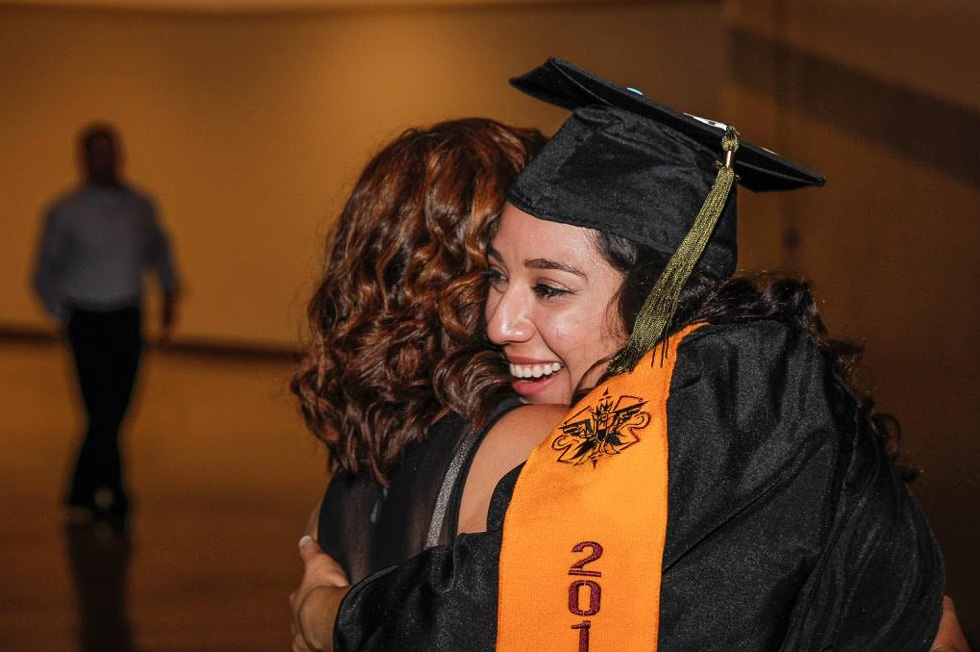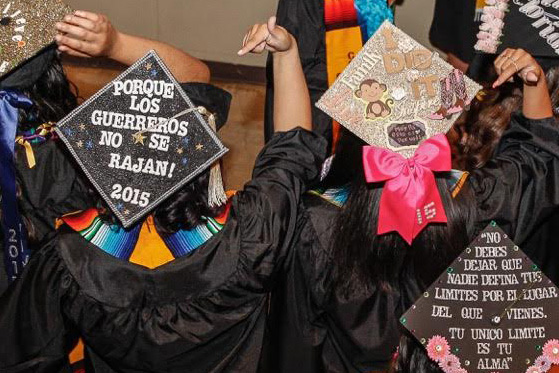
A moment to remember at the 2015 Chicano Commencement (Photo: Sergio Estrada | Estrada Photos).
In 1968, a group of Chicano students participating in the San Jose State commencement ceremony at Spartan Stadium peacefully walked out of the president’s speech in protest of lackluster resources and in support for students of color. They created their own “Chicano Commencement” to celebrate their accomplishments, and a tradition was born.
Now 48 years later, Chicano Commencement has evolved into an elaborate event where participating students invite loved ones on stage, give speeches and share cultural food while enjoying mariachi music. The event is one of several dozen convocations and receptions held annually by departments, programs and student groups.
“This is rooted in history,” said Lizbet Huizar, ’16 MA Mexican American Studies and co-chair for Chicano Commencement. “Back in the day, it was just a few parents putting together a potluck and through the years, it’s expanded to what we see now, which is a $50,000 celebration.”
By hosting fundraisers on campus, participants of each year’s commencement aim to raise $50,000 toward planning and supplying an event location, food and entertainment. The organization is currently $15,000 shy of their goal.
Loved Ones

Honoring friends and family in 2015 (Photo: Sergio Estrada).

2015 caps (Photo: Sergio Estrada).
Huizar said 60 graduates will enter the Event Center accompanied by two loved ones and have the opportunity to bestow “Stoles of Gratitude” to their loved ones in honor of their support.
“I thought this was a perfect thing to add to find different ways to connect our parents even more to this ceremony,” Huizar said.
For Irma Flores, ’16 Behavioral Science, her family support system eased her “rollercoaster” of a transition when she learned she was pregnant in her second semester at SJSU.
Flores comes from a family of hard workers; her grandfather came to the U.S. as a fieldworker as part of the Bracero Program in the 1940s, her mother cleaned houses and her father has worked in the fields during Flores’ upbringing.
“My mom has always told me ‘go to school’ and she’s always pushed that on me,” Flores said. “I just wanted to be a good role model for my daughter because I wanted her to grow up with everything I didn’t have.”
Andrea Fernandez, ’16 Communication Studies and co-chair of Chicano Commencement, said she believes the ceremony is as much about celebrating family and loved ones of graduates as it is for the students who participate.
“I want to recognize all the families and friends present because they are a huge part of the journey here as Spartans,” Fernandez said.
Progress
Some journeys prove to be historically bumpier than others, and only flourish by an aspiration for a better life.
Andrea Ruiz, ’16 Public Relations, is the programming chair of the ceremony and has been fueled by her parent’s journey from Oaxaca, Mexico, to the United States.
“I’ve realized the biggest thing that they’ve ever granted me was the ability to dream,” Ruiz said. “[Chicano Commencement] highlights how we can progress as a culture, as a community, that change is coming.”
In 1969, 11 students participated in the commencement protest and now 60 students will grace the Event Center stage as part of this historic event. But Fernandez wants those numbers to steadily increase for years to come.
“I think it just shouldn’t be 60, I think it should be every single Latino and Chicano student who is graduating. It’s almost like a hidden gem of the university that people find out through word of mouth,” Fernandez said. “Our focus is to make it as inclusive for anybody who attends just as it is for their graduates, so I think it brings cultural awareness to the campus as well.”
Activism
‘This year Damien Trujillo,’93 Journalism, will take a break from his reporting gig at NBC Bay Area to deliver the keynote speech, a speech that Fernandez said she hopes resonates with the emerging professionals.
Most notably though, Huizar said Chicano Commencement’s legacy should endure through the activist spirit on which it was founded.
“We’ve really emphasized this year that this is an organization of activism. It’s not the same as before, when you would get out and go protest, but there is still this responsibility that you have to help your community in any way possible,” Huizar said. “I feel like these graduates are going to go out there, do whatever they can, wherever they work, as they now have knowledge of what it means to be a Chicano or Chicana.”
